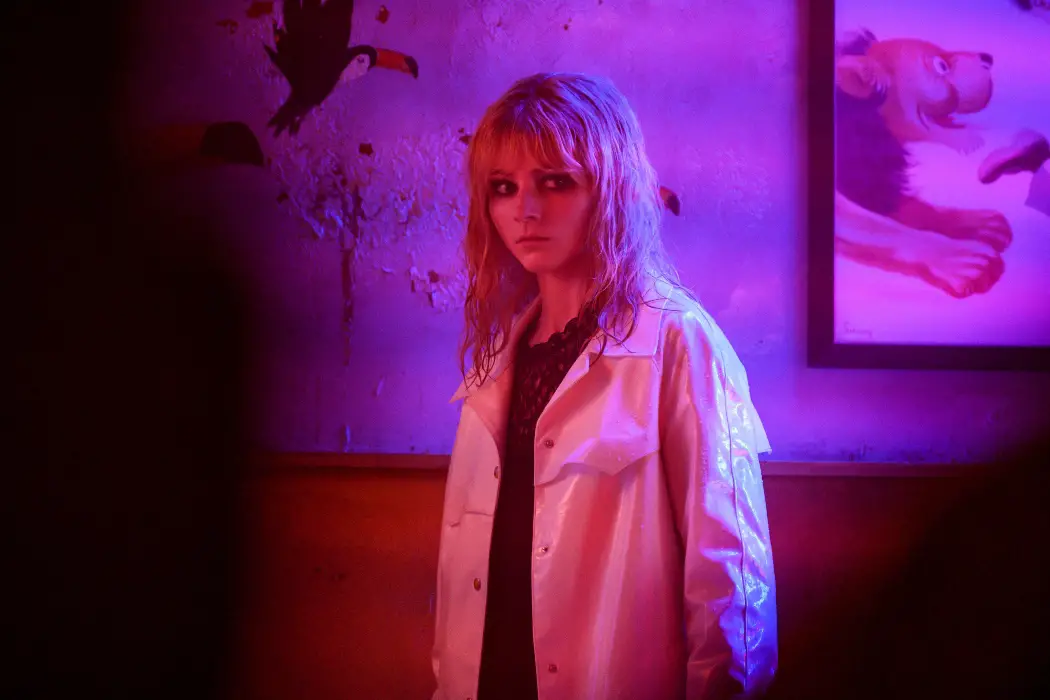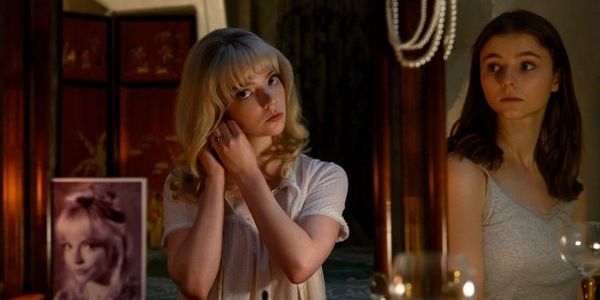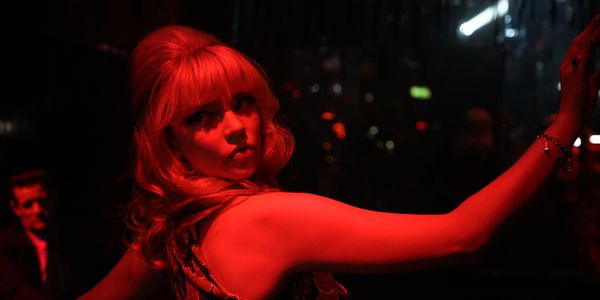TIFF 2021: LAST NIGHT IN SOHO

Wilson is a cinema enthusiast based out of Toronto, Canada.…
When it comes to a film by Edgar Wright, expectations are usually high for something that unabashedly bleeds of cinematic energy. And with Last Night In Soho, that level of expected energy certainly comes through. The film is abundant in its declaration of love for 1960s London, with Wright proving his evolving mastery of the cinematic language once again. Stylistically, this is a grand exercise in filmmaking that is unlikely to disappoint cinephiles hoping for something marvellous to gander at. Similar to his previous work, the beat-to-beat energy is always palpable throughout the film. But the third act unfortunately fumbles in its appeal to be a cohesive narrative, making it difficult to label it as a truly engaging piece of cinema.
The film starts off with Eloise (Thomasin McKenzie), an aspiring fashion designer from a small town, making the move to London in order to pursue her dreams. Her initial impressions are marred by unpleasant interactions that eventually force her to leave student housing, and instead move into the top floor of a complex in what appears to be a shadier part of downtown London. Through reasons that are completely unknown to her, her dreams lead her into the shoes of a 1960s socialite named Sandy (Anya Taylor-Joy). Although Eloise is initially enamoured with Sandy’s life and yearns for her dreams to begin each night, a darker reality begins to set in and she begins to lose sense of what’s real and what’s not. With strong supporting performances by Matt Smith, Diana Rigg, Rita Tushingham and Terence Stamp, there’s no shortage of talent in this psychological mystery that seems to bends both genre and time.
A technical and performative marvel
As Last Night in Soho settles into its time warping dream sequences, Wright sets up an impressively tense style of narration that is just as engaging as the premise of the film might suggest. The sense of mystery with its hints of horror work in perfect balance, and you’re simply drawn into a perfectly executed premise of world building. There’s more than a few sequences with camera trick work and Chung Chung-hoon brings his A-game (as he always does) in creating balanced set pieces that are both immersive and tantalizing. The exuberant nightlife of the 1960s is captured in an eloquent manner, and Wright’s direction pushes each sequence to a dream-like reality whenever it’s needed. Steven Price’s score also permeates much of the film, shifting the film’s ambiance between drama and horror, and everything in between.

All this is to say that the technical aspects of Last Night in Soho are hard to criticize, and the same must be said of the film’s two leading actresses. Mckenzie impresses in her tamed and quiet demeanour, which transforms into a beacon of strength as the story progresses into unexpected territories. Taylor-Joy is simply mesmerizing in her ability to enchant viewers with her body language and wide eyes, resulting in a mystical aura that perfectly encapsulates the essence of her mysterious character. And although the two actresses don’t necessarily exchange too much dialogue with one another given the story’s structure, the amount of physical chemistry shared in the film’s dream sequences shouldn’t go unnoticed. There’s no question that both these young actresses will continue to flourish and any praise they garner from this film is nothing other than well-deserved praise.
An unfortunately floundering third act
With the impressive groundwork laid out by Wright et al., there are high expectations as the film progresses into its final act and promises to reveal its hand and provide closure to this intensely psychological thrill ride. And although Wright and Krysty Wilson-Cairns are quite ambitious in their attempts at crafting something truly unexpected, the result is unfortunately a misfire in narrative storytelling. The dark turns that Sandy’s character experiences aren’t necessarily problematic on its own, and opens up the doorway for the film to make particular statements about the abuse of power that continues to enslave women who end up in these unfortunate circumstances. But the film doesn’t really tread down this particular avenue, and instead, opts for a genre flip to something that envelops both horror and supernatural elements. The implausibility of the scenario that transpires isn’t the problem as the film was never fully grounded in reality, but the sudden tonal shift is both abrupt and feels almost unnecessary.

To be fair, the technical prowess of the film continues to hold its own during this faltered third act, and the execution of the finale to this gripping story comes with few flaws. But the narrative approach of Wright and Wilson-Cairns simply takes away from everything that came before it. Instead of being a story that focuses on the internalized angsts and emotions of Eloise’s innocence and Sandy’s mysterious confidence, it takes an overtly haunted direction and almost morphs into a B movie during its climactic sequences. The turn is definitely surprising and might work for certain viewers who buy into the film’s signposting of genre mixing right from the get-go. But with deeply rooted character performances that felt so nuanced and complex, this divulsion into a supernatural frenzy feels like a shortcoming for such a contemplative setup.
Final Thoughts
Despite a rather disappointing third act, Last Night in Soho still manages to be an engaging cinematic experience thanks to its impressive technical and performative entities. Wright continues to prove himself as a talented filmmaker, and perhaps his creative approach to how he saw this particular story closing out just wasn’t in keeping with what was seemingly promised earlier in the film. And because of that, Last Night in Soho does feel like a bit of a letdown, albeit one that is beautifully crafted and well-acted, and still worthy of your time.
Last Night in Soho premiered at Toronto International Film Festival.
Watch Last Night in Soho
Does content like this matter to you?
Become a Member and support film journalism. Unlock access to all of Film Inquiry`s great articles. Join a community of like-minded readers who are passionate about cinema - get access to our private members Network, give back to independent filmmakers, and more.
Wilson is a cinema enthusiast based out of Toronto, Canada. He escapes from his day job by writing random thoughts about cinema on the internet. Although he has a longstanding penchant for Hong Kong cinema, he considers himself to be an advocate for Asian cinema in general. He has been attending the Toronto International Film Festival every year since 2005, and more of his work can be found on his website: www.wilson-kwong.com.













